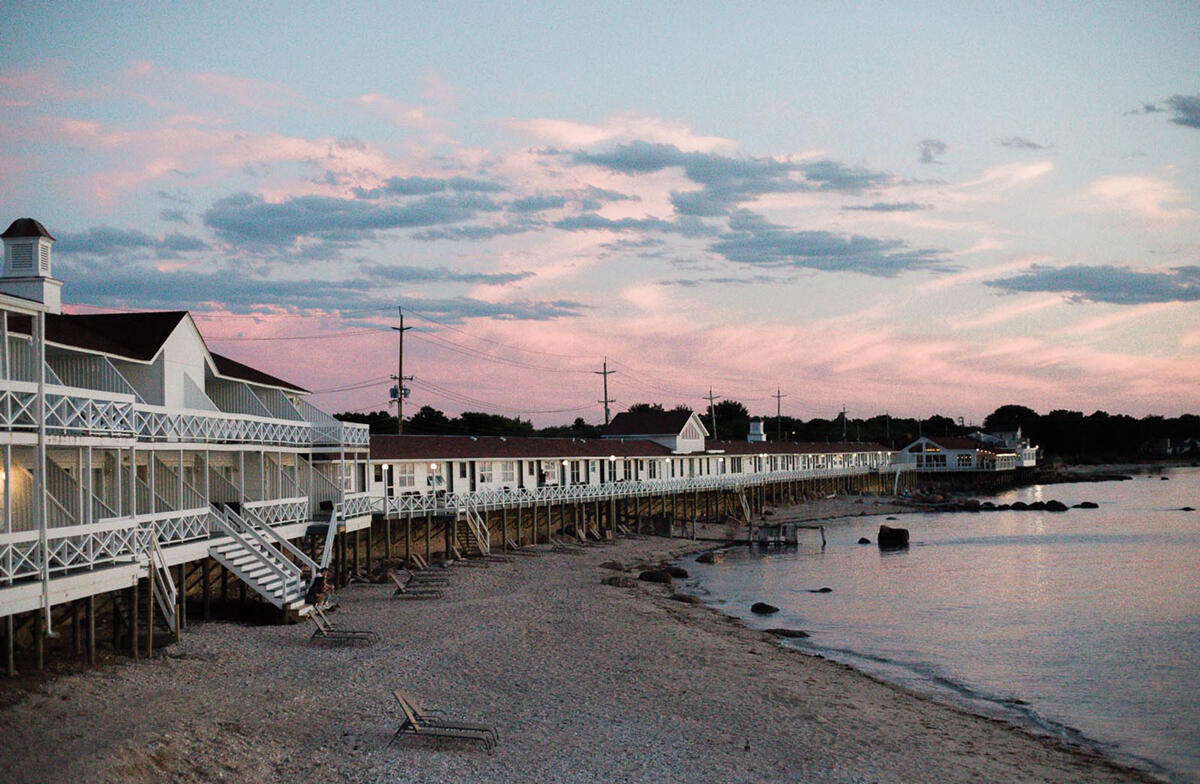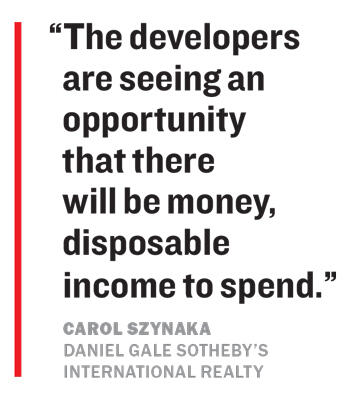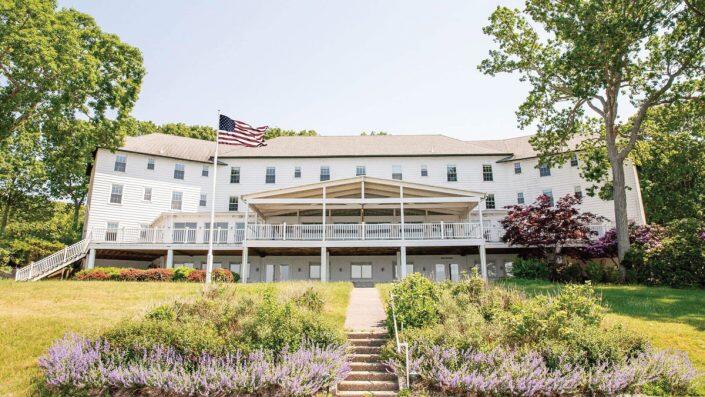
Sound View Hotel, Greenport (Photo courtesy of Sound View)
Jon Hoenig’s family and his business call New England home, but he feels a personal connection to Long Island’s North Fork, too.
Hoenig and his wife of six years, Jennifer, were wed at a winery in the hamlet of Cutchogue, and for more than a decade, he says, he’s made countless trips on the New London ferry to Orient Point to visit family and friends out east.
It was around the time they got married, Hoenig says, that he and Jennifer began “falling in love” with the North Fork — a peninsula stretching roughly 30 miles on the East End of Long Island from Riverhead to Orient Point, which has long held itself as a sort of agricultural, small-town antithesis to its southern neighbor, the Hamptons.
“I knew [the North Fork] was kind of this sleepy place that was starting to wake up,” Hoenig said. “I felt that when we got married out there, it was kind of the cool new area, but not everyone knew about it.”
Hoenig had his eye on the area in 2020 when he founded his investment firm, Atlantic Equity Partners, which specializes in buying and repositioning hospitality properties perceived to be either undervalued or underperforming.
One of his trips to the North Fork that year brought him to the Menhaden Hotel, a 16-room inn in Greenport with a restaurant and rooftop bar that opened in 2018. When Hoenig learned the owners might be open to selling, he jumped at the chance. His firm bought the hotel for $8.3 million last year — or about $550,000 per room.
“We saw an opportunity where we could get into this great market,” Hoenig said. “We can clearly see it’s growing, but there’s a long way to go. People have started to discover it, but we think there’s a long road ahead where people really figure this out.”
A changing of the guard
Hoenig’s story is one that has become increasingly common on the North Fork: Out-of-town developers and investors have been injecting millions into in a market where the barrier to entry is steadily rising and the limited number of lodging establishments tend to be owned not by private equity firms or hotel operators, but individuals — often with deep roots in the community.
In 2016, Manhattan-based investment firm Eagle Point Hotel Partners bought the Sound View, a roadside motel and restaurant, also in Greenport, which had been owned by the same family since the 1950s. After a renovation, the Sound View now brands itself as “an elegant waterfront sanctuary” that provides guests with a “sweeping sense of nostalgia.” Room rates for the weekend of June 10 start at $536 per night, according to its website.
 Three years later, Eagle Point picked up Greenport’s Harborfront Inn Hotel, built in 2003, for $9.5 million.
Three years later, Eagle Point picked up Greenport’s Harborfront Inn Hotel, built in 2003, for $9.5 million.
On Shelter Island, accessible via ferry from both the North and South Fork, the century-old Pridwin Hotel and Cottages will reopen this month following a $28 million renovation by Curtis Bashaw’s Cape Resorts, which purchased the property last year from the Petry family, its owners and operators since the 1960s. The island’s largest hotel has been revamped into a luxury resort with larger rooms, a fitness center and a 100-seat restaurant.
In Cutchogue, developer Stacey Soloviev, ex-wife of Soloviev Group Chair Stefan Soloviev, is planning a 40-key boutique hotel and resort on her 53-acre Peconic Bay Vineyard in Cutchogue. The resort is also expected to include 12,000 square feet of retail and a five-star eatery to complement the wine.
Following the buyers
The North Fork’s trajectory from a quiet haven to a high-demand real estate destination can be traced as far back as 2014, when buyers priced out of the ultra-expensive Hamptons began settling for cheaper, less ritzy waterfront alternatives.
“It’s a different lifestyle here. It’s more relaxed,” said Carol Szynaka, a local broker for Daniel Gale Sotheby’s International Realty. “What [people] were really looking for is that quality time to just kick back, take it a little easy. They still want the amenities, but they do not want the fanfare.”
The pandemic only added fuel to the fire, as more city dwellers flocked east in search of additional space. With schools and workplaces upended, weekend visitors became seasonal dwellers. Others stayed year-round.
“The best part of what I’ve seen come off of Covid is … people discover all little nooks and crannies to the East End,” Town & Country Real Estate’s Judi Desiderio said. “There are people who actually said, you know what, I can work remotely, or it’s time for me to do my dream.”
Now, properties on both the North and South forks are routinely snapped up days after being listed, and buyers almost always have to be ready to put down the money — even before a home hits the market.
With inventory down and demand up, prices have skyrocketed. The median home sale price in the North Fork rose 13 percent year-over-year to a whopping $800,000 in the first quarter of 2022, according to data compiled by Town & Country Real Estate.
Meanwhile, the number of home sales dropped by almost 22 percent. Sales of homes for less than $500,000 declined by two-thirds — perhaps the most striking sign that the North Fork is increasingly resembling the Hamptons.
The wave of outside investment in even the most modest hotels has been spawned by the strength of the residential market and the price points at which buyers are now entering the region, locals say.
“I think that because of the affluence of the residents that are buying into the community, the developers are seeing an opportunity that there will be money, disposable income to spend,” Szynaka said.
Local skirmishes
Residents have long feared that these development projects could lead to more traffic and transform the North Fork from a peaceful waterfront oasis into an upscale tourist destination much like its counterpart to the south.
As the New York Post described it in a May 24 dispatch, North Forkers “are furious about a post-pandemic influx of tourists and transplants turning their jut of land into a crowded playground for tone-deaf city folk, a.k.a. ‘cityiots.’”
Much of the North Fork is either off-limits to development, thanks to zoning and conservation easements, or has remained farmland because of tradition and profitability.

Pridwin Hotel and Cottages, Shelter Island (Photo courtesy of Cape Resorts)
“It’s very hard to develop on the North Fork,” Erik Warner, co-founder of Eagle Point Hotel Group, told The Real Deal last year. “It will always be hard to develop on the North Fork, because not a lot of land is zoned for hotels.”
Last year, residents of Southold called on local officials to change the zoning code and limit the construction of massive homes they said block the sunshine, disturb natural resources and otherwise destroy the community character. A house on a 2-acre lot in Southold can legally exceed 40,000 square feet — perhaps a fit for Southampton, but unfathomably large for the North Fork . Although the town code limits height, there is no absolute maximum building area.
“It feels now like Southold is rapidly turning into the Hamptons,” East Marion Community Association board member Anne Murray said at the time.
But investors like Hoenig claim they aren’t interested in changing the fabric of the region for the sake of profit. It’s the quaint community of the North Fork that attracts their clientele to begin with, they say.
“If you come in with a heavy hand there and don’t communicate, I think you’d have a problem,” Hoenig said. “That’s just how these small villages work. They have a lot of control over development, and it’s smart because they’re the ones that live there full time and they know what the community is.”
Having owned the Menhaden Hotel for a year, Hoenig said he loves the property and that it’s been a good investment so far. His firm has plans to upgrade a few things at the hotel and add a new food and beverage concept, Hoenig said. But he ultimately wants to keep the hotel “simple and cool.”
Not all investors seem to share Hoenig’s vision, as evidenced by the decade-long battle over the nearby Silver Sands Motel and Cottages
Set on 30 acres, the beachfront 1950s-style motel was until recently owned by Jean Burden, whose parents opened it decades ago, along with her son, Terry Keefe, and Darline Duffy, her brother’s widow. Duffy sold her stake in the motel last year to Silver Sands Holdings, a limited liability company tied to developer Thunderbowl Capital, according to reports.
Keefe claimed Silver Sands Holdings was pressuring the family to turn the property into a high-end resort, which they had no interest in doing. Soon thereafter, Silver Sands Holdings filed a lawsuit alleging the family had mismanaged the motel’s finances.
Silver Sands Holdings ultimately acquired the motel for an unspecified amount in April and plans to spend $4 million to upgrade the property while keeping its old-school aesthetic, Newsday reported.
Another developer, Jonathan Tibbett, scored a victory in December, when the Southold Zoning Board of Appeals conditionally approved his planned Enclaves Hotel and Restaurant despite concerns from residents over possible traffic and noise issues. Plans call for the conversion of the Hedges — the existing bed-and-breakfast on the property — into a restaurant with a 584-square-foot addition as well as a two-story, 40-room hotel next door with parking for over 100 cars.
The catch: The 44-room hotel and 74-seat restaurant will not be permitted to host outdoor events, and indoor events will be limited to fewer than 100 guests.
Despite looming economic uncertainties, including concerns over rising interest rates, and a less than welcoming reception from some locals, investors like Hoenig are confident that the North Fork will remain a lucrative place to do business.
“I think it’s gonna be strong for the foreseeable future,” Hoenig said. “If we do have a recession or if we do have a correction coming up … there’s such limited inventory out there that I think most of the properties will still perform well.”
Read more


